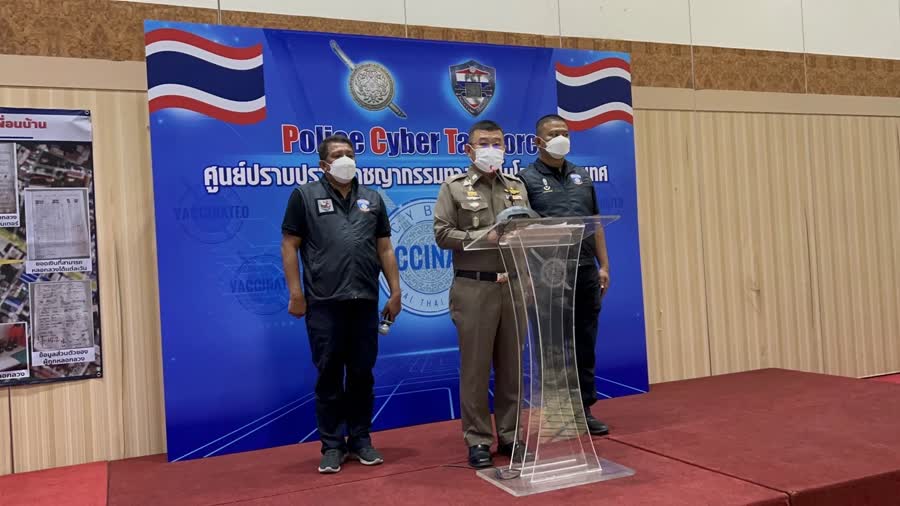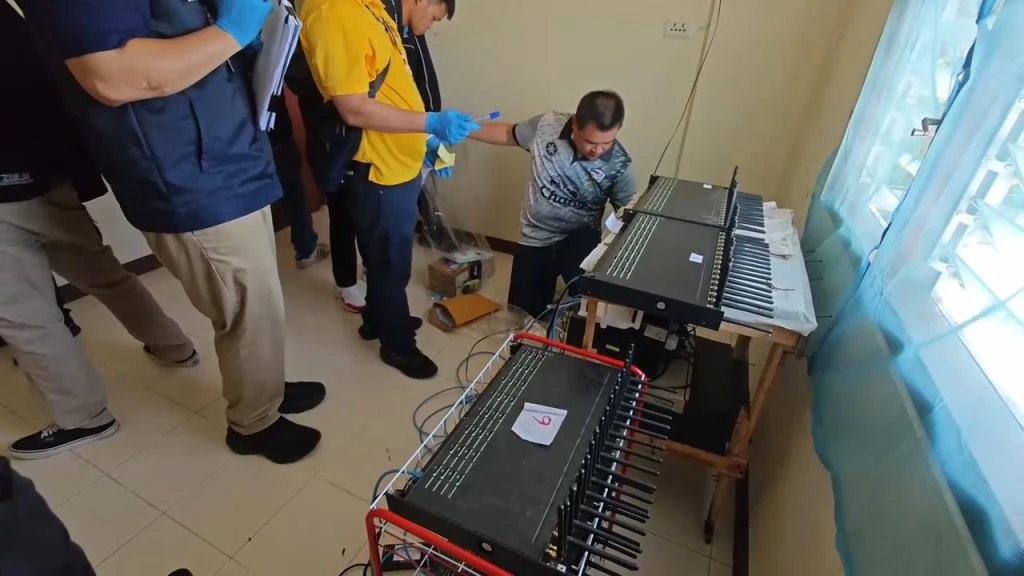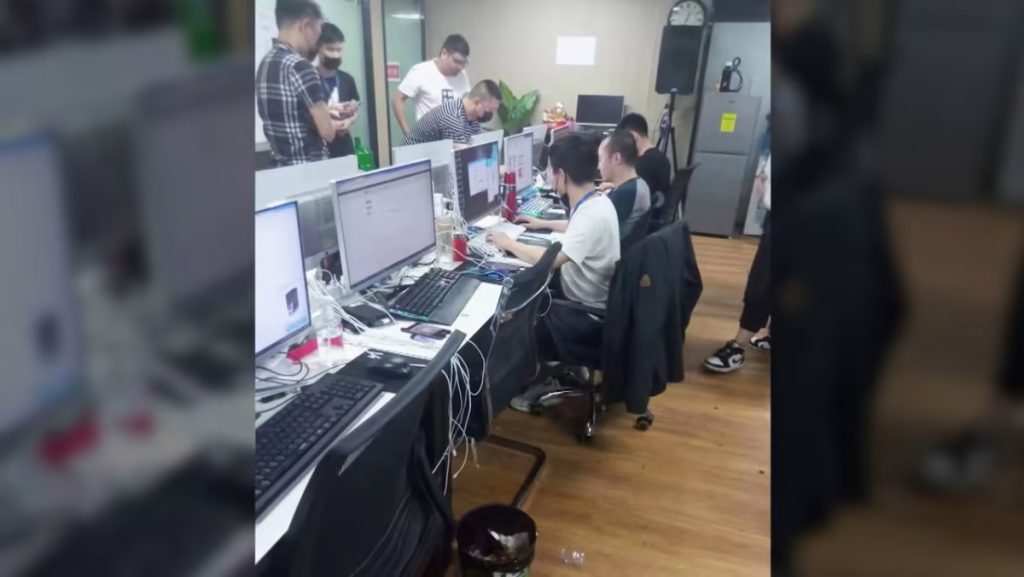Crime
Unscrupulous Call Centre Gangs Targeting the Elderly in Thailand

A 68-year-old housewife lost 1.5 million baht in savings within 30 minutes after she answered a phone call from a gang of scammers. A member tricked her by posing as a bank agent and telling her she was eligible to receive 5,000 baht from a new government financial aid scheme.
They asked if she wanted to receive the money through a bank branch or a mobile banking app. Receiving money online was her preferred choice. The agent told her to add a Line account. She clicked on a provided link and gave all her details, including her 13-digit ID card number, date of birth and photo.
After completing the process, the scammer told her the information could not be processed. The gang gave link after link until she finally realised she had been scammed. But it was too late: within 30 minutes, she had lost 1.5 million baht in life savings.
In a second instance, an 82-year-old woman named Ms. Sonklin attempted to end her life by writing a letter to her two adult children outlining her final intentions. She had lost 2.5 million baht of her funds to a gang of con artists who said the authorities had discovered contraband in a package that was about to be sent to her through a Phuket post office. They advised her to lodge a complaint with the resort island police.
Living in Bangkok with her 83-year-old bedridden husband, she said she could not do so. The scammer told her to add a Line account to talk to the police.
A fake police officer then asked her for her personal information and send him money. He taught her how to install a mobile banking app.
She transferred almost 2.5 million baht to the scammer in two weeks before the gang vanished. When she realized she had been duped, she attempted suicide, but fortunately she survived.
Another case was a 67-year-old housewife in Udon Thani province who committed suicide after being duped out of 300,000 baht.
“Elder retirees are one of the scammers’ targets because they have money and time,” said Pol Maj Gen Atthasit Sudsa-nguan, deputy commissioner of the Cyber Crime Investigation Bureau (CCIB).
”Facing persuasion and threats, the elderly tend to believe the first [scam] message they receive.”

Police Overwhelmed Over Scam Gangs
He said that from March 1 last year to Nov 10 this year, police dealt with 360,000 cases related to cyber crime, including online fraud and fake loans. The total damage was worth about 49 billion baht.
“We believe the real number of cases may be higher than recorded because some victims do not file complaints,” he said.
“Although police work hard to arrest those in scamming networks, it is better if people can prevent becoming victims in the first place.
“When the public receives calls or messages claiming to be official, hang up first. Then, look up the real number of the alleged agency and recheck the information.”
Do not click on links sent via Line or SMS and refrain from making transactions out of fear, he said.
If someone thinks he or she is a victim, they should call the Anti Online Scam Operation Centre’s 1441 hotline for help, he said.
Common Threat in Thailand, China and Japan
These types of scams are common in Asia as 60% of residents in the region face at least one attempt per week, according to the 2023 Asia Scam Report released on Nov 20 by the Global Anti-Scam Alliance (Gasa) and Gogolook.
Their study surveyed almost 20,000 participants from 11 nations in Asia, including China, Thailand and Japan.
It found that phone calls and SMS were the most popular method of communication for scammers in Asia. Amid the increasing popularity of digital services, scammers are rapidly shifting to using messaging apps such as WhatsApp, Telegram and Line.
Scammers are also active on social media platforms such as Facebook and Instagram.
In Thailand, the study found the top five “channels” for scammers are the phone (88%), SMS (59%), instant messaging apps (27.8%), social media (16.8%) and digital advertising (14.1%).
Among digital platforms, Facebook is the number one channel (47.3%), followed by Line (40.4%), Gmail (10.6%), TikTok (9.2%) and Instagram (6.1%).
The study also found the most popular techniques in Thailand involved goods delivery fraud (17.9%), credit card fraud and identity theft (15.2%), investment scams (9.1%) and government or banking scams (8.8%).
“The shadows cast by scams is looming larger across the digital expanse of Asia,” said Jorij Abraham, managing director of Gasa.
The report can equip stakeholders with knowledge that can serve as both a shield and spear against fraudulent actors operating within Asia, he said.

Police Give Emotional Appeal
Pol Lt Col Saksit Choobunrueang of the CCIB said people fall victim to call centre gangs because they lack the knowledge to identify scams. They are lured by incentives that are too good to be true, he said.
“Most victims do not know they are tricked until it is too late because call centre scam gangs are always developing new tricks that trigger emotions such as fear or greed,” he said. “The best way [to avoid being scammed] is stay aware and not panic.
“Whatever tricks they have, they want to lure you into transferring money,” he said. “So, don’t believe it if someone calls you and says you are involved in an illegal activity. Just hang up.”
He said the police will try to eliminate the problem by arresting holders of mule accounts. Without them, money cannot reach gang leaders, he said.
Stolen money is generally transferred to “several layers” of mule accounts before reaching the top, similar to the shape of a pyramid, he said.
At the top, the money is used to purchase cryptocurrency or other valuables such as gold, he said. If not, cash is carried across the border into a neighbouring country where the gang leaders reside, he added.
“Their work is quick. Within 30 minutes, the money is gone,” he said. “Once the money is exchanged into cryptocurrency, it will be hard to trace.”
When asked why police can only arrest mule account owners instead of the masterminds, he said most scams are international crimes and the criminals are based in neighbouring countries, making arrests difficult.

Thai’s Taking part in scams
The government recently repatriated about 300 Thai nationals from Myanmar’s Laukkai, in the northern Shan state. Most of them were lured by fake job offers on social media. Some were victims of human trafficking but others were willing to take part.
Surachet Hakpal, deputy commissioner of the Royal Thai Police, said that some faced arrest warrants for allegedly opening mule accounts for scams.
Thai nationals in Cambodia’s Poi Pet city in western Banteay Meanchey province had also asked the government to help with their repatriation, Pol Gen Surachet said.
On Dec 1, the Pavena Foundation for Children and Women brought 16 victims of a call centre gang in Cambodia to report to police.
They were lured to work in Poi Pet with promises of good salaries but ended up forced to work for the gang, said Pavena Hongsakul, foundation chair.
Ms Pavena said they were told to open bank accounts to receive their salaries but after travelling to Poi Pet, their passports, mobile phones and bank books were seized by a Chinese gang leader.
They were tortured using electricity when they resisted to follow the leader’s order, she said. One victim, a 19-year-old girl, was raped by the gang leader, she added.
The gang sent the group back after learning all 16 bank accounts had been suspended by the police.
The police charged the 16 people with owning mule accounts that caused 20 million baht in damages. The foundation took them to the police to say that they were in fact the victims.
“Do not fall for false advertisements on social media offering good paying jobs in neighbouring countries,” Ms Pavena said. “There are no such offers.”
As for victims who lost their money to call centre gangs, they tend to never get it back.
“It is hard broken to tell my Mum [Sonklin] that all of her life savings are gone,” said Trakul, her son.
“She always asks me if she will get her money back. Police can catch mule account owners but not get the money back. I hope the police can catch the mastermind and I wish my Mum’s will be the last case,” he added.
Crime
Police Officer Being Ordained at Temple Arrested for Running Scam Call Center

Police in Northern Thailand have arrested a fellow officer as he was being ordained at a temple in Ngao district of neighbouring Lampang province.
Pol Lt Col Bandit Khonkan chief inspector from the Hang Dong police station was disrobed and taken to the Chang Puak station in Chiang Mai. He was arrested on charges of running a call centre scam gang in Chiang Mai Province.
According to Thai Media Chiang Mai Provincial Police Region 5 obtained an arrest warrant for Pol Lt Col Bandit on Friday from the Chiang Mai Provincial Court for procuring illegal telecom equipment, setting up a station and using public airwaves to run a telecommunications business without permission.
Pol Lt Col Bandit reportedly told investigators that he was not the ringleader and was only a member of the gang with Chinese partners.
His arrest followed the apprehension of his 26-year-old daughter, Miss Wanuchapond, 26, and three others during raids at three housing projects in Chiang Mai on Friday, Pol Maj Gen Weerachon Boontawee, deputy chief of Provincial Police Region 5 told Thai media.
During the raids police police discovered around 12 GSM gateways, or SIM boxes, which are devices used for converting cellular networks into mobile phone numbers used domestically.
The chief inspectors daughter Miss Wanuchapond told the arresting officers that she was paid 8,000 baht a month at each of the three locations for renting thr rooms and monitoring devices.

She claimed she had no idea what the devices were and accepted the job because the pay was attractive.
Police investigators working with telecom regulators used a special tracking device to monitor the gang’s communications and learned that its base was in Myanmar opposite Mae Sai district of Chiang Rai.
The call center gang used the GSM gateways to make calls over the internet to scam people in Thailand out of million of baht.
The GSM gateways transmitting signals via SIM boxes to convert them into domestic phone numbers, duping victims into thinking they were being called from Thai government agencies.
Pol Maj Gen Weerachon said that each SIM box held 32 SIM cards, with a capacity of up to 300,000 calls a month. The seized devices had made fraudulent calls over 3.6 million times.
He said the their investigation is ongoing and they are working to track down the remaining conspirators, including Chinese and other Thai suspects.
Authorities are still deciding whether Pol Lt Col Bandit will be dismissed from the force, he said, adding that so far, no other officers are known to have been involved.

Meanwhile, Prime Minister Settha Thavisin has authorized the establishment of an emergency cyber center operated by the Royal Thai Police to combat transnational crimes committed by call center gangs along the Thai border in Chiang Rai province.
On July 19, Prime Minister Settha Thavisin directed the Center to combat information technology crimes. The Royal Thai Police (Royal Thai Police) will crack down on call center gangs in Myanmar, Laos, and along the border.
His directive comes as call center gangs ratchet up their scams to defraud people of their money, causing concern among Thais and jeopardizing the country’s economic and social stability.
Related Police News:
Machete Wielding Man Shot an Killed by Police in Chiang Rai
https://www.chiangraitimes.com/chiangrai-news/machete-wielding-man-shot-an-killed-by-police-in-chiang-rai/
Crime
Thai Immigration Police Arrest Colombian Tourists Over Home Invasions

Immigration police officers have arrested four Colombian nationals in connection with a series of home burglaries at luxury housing complexes in the Bangkok metropolitan area and Chiang Buri Province.
Pol Maj Gen Panthana Nuchanart, deputy commissioner of the Immigration Bureau, told a press briefing that three of the suspects were apprehended in Nonthaburi Province and the fourth in South Pattaya, Chon Buri Province.
According to the Bangkok Post, the Colombians were charged with stealing conspiracy and seized around 3 million baht (US$82,500.00).
According to Pol Maj Gen Panthana, the criminals rode motorcycles through housing estates, scoping out the properties and waiting for the owners to depart before committing their crimes.
He stated that all four of the accused denied any involvement in the home break-ins, but the arresting squad discovered evidence that implicated them.
Police called to home invasion
Meanwhile, police were dispatched to a luxury housing development in Tambon Nong Prue, Chonburi Province, after a Chinese man was attacked during a house invasion.
When they arrived, they discovered the house owner, Mr. Qian Peng Yi, visibly scared and with marks from being tied up with a cable. He informed police that three Chinese males broke into his home at 9 p.m., one of whom brandished a gun at him and directed him to his bedroom.
They bound his hands and feet, gagged him with fabric, taped his head, and forced him into the bed. The intruders then attempted to compel him into transferring 10 million baht in cryptocurrencies to them, endangering the life of his 33-year-old cousin who was in a second-floor bedroom.
While they scoured the house in search of riches, Mr. Peng Yi managed to flee and hide; he subsequently observed them leave with his cousin. Officials investigated the property and analyzed security camera footage from the incident and surrounding areas.
Around 9 p.m., a 30-year-old van driver came at the Bang Lamung police station after being contacted by an agency to carry Chinese customers from Pattaya to Suvarnabhumi Airport.
The driver informed authorities that he was supposed to pick them up at a motel about a kilometer from the Chinese businessman’s home. He then drove them to Bangkok’s Suvarnabhumi airport, arriving at 1 a.m. and receiving 1,800 baht.
The driver took a snapshot of the group smoking at the airport gate and identified one of them as the victim’s cousin. Police suspected coordination between her and the three suspects in her cousin’s heist, who all departed Thailand on the same aircraft.
Other Bangkok News:
Police in Bangkok Discover Six Vietnamese Tourists Dead in 5 Star Hotel
Police in Bangkok Discover Six Vietnamese Tourists Dead in 5 Star Hotel
Crime
Son of Thailand’s Leading Legal Scholar on Corruption Arrested for Running Online Gambling Network

The son of a former senator and leading economist and expert on corruption and gambling in Thailand has been arrested for on charges of running an online gambling network and its payment system.
Police from Thailand’s Technology Crime Suppression Division (TCSD) have confiscated assets worth more than (US$ 11.1 million) 400 million baht.
Narote Piriyarangsan, 33, was arrested following crackdowns in three sites around the city, according to Pol Maj Gen Athip Pongsiwapai, commander of the police Technology Crime Suppression Division (TCSD).
Mr Narote’s father, Sangsit Piriyarangsan, is an economist who has written articles and books about corruption and gambling. He was one of the appointed senators that were investigating the government’s intention to legalize casino gaming before their terms expired.
Police also detained 39-year-old Narayut Narakaew, the owner of the gambling website 69pgslot.com. The Criminal Court issued arrest warrants for the couple for operating an internet gambling service and money laundering.
According to the Bangkok Post, police seized two desktop computers, one laptop computer, 14 mobile phones, 21 bank passbooks, 53 ATM cards, and four high-end cars — a Ferrari 926 GTS, an Aston Martin, a Lexus, and a Subaru — totaling more than 400 million baht.
Police launched the inquiry after discovering the online gambling site, which accepted funds via an automatic deposit-withdrawal system through bank accounts and deposits in the AskMePay system. Players scanned the VPay QR code as well as the QR codes for Heng Online 888 or Heng Pay Company.
Police also discovered that payments received via QR code scans were transferred to the account of Heng Pay Co and then to the gambling website’s mule accounts using AskMePay, which did not use banks’ face recognition scanning. An inquiry indicated a monthly turnover of approximately 5 billion baht.
According to investigators, the website has been up and running for around four years, with the payment mechanism in use for roughly eight months.
According to Pol Maj Gen Athip, Mr Narote owns the gaming website’s payment systems and is the director of Heng Pay Co. After gathering evidence, authorities requested arrest warrants for 14 people.
Thailand does not allow almost any kind of gaming. Even though the law doesn’t say anything specific about online gaming, it is still considered gambling. The country has pretty strict rules about gambling. Thai punters can bet on the national lottery and horse races, but they can’t bet on any other types of games.
But it’s not a secret that there is a huge illegal gaming business in Thailand, even though it’s illegal.
The illegal casinos, online betting shops, underground lotteries, and pop-up bookies that take bets on everything from cockfights to Muay Thai make a shadow economy that is worth billions of dollars every year.
Related News:
Thailand’s Cyber Crime Police Raid Top Cops Home Over Gambling Websites
Thailand’s Cyber Crime Police Raid Top Cops Home Over Gambling Websites
-

 News3 years ago
News3 years agoLet’s Know About Ultra High Net Worth Individual
-
Entertainment2 years ago
Mabelle Prior: The Voice of Hope, Resilience, and Diversity Inspiring Generations
-

 Health3 years ago
Health3 years agoHow Much Ivermectin Should You Take?
-

 Tech2 years ago
Tech2 years agoTop Forex Brokers of 2023: Reviews and Analysis for Successful Trading
-

 Lifestyles2 years ago
Lifestyles2 years agoAries Soulmate Signs
-

 Movies2 years ago
Movies2 years agoWhat Should I Do If Disney Plus Keeps Logging Me Out of TV?
-

 Health3 years ago
Health3 years agoCan I Buy Ivermectin Without A Prescription in the USA?
-

 Learning2 years ago
Learning2 years agoVirtual Numbers: What Are They For?

